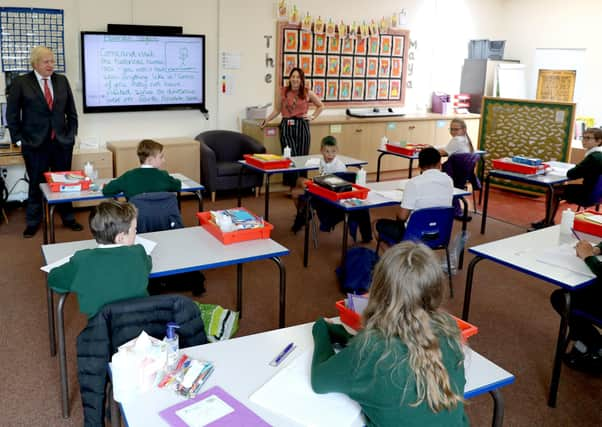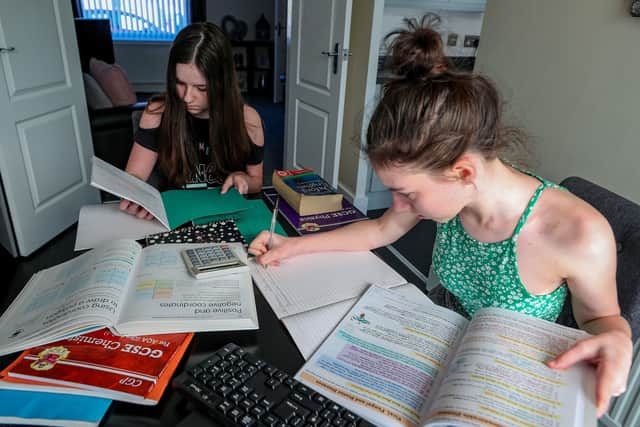An impoverished school curriculum risks ruining a generation – Joanna Williams


After five and a half long months at home, the prospect of children going back to school in September is something to celebrate. But before breaking out the Prosecco, we need to ask exactly what it is children will be going back to do.
According to the Education Secretary, Gavin Williamson, schools will be anything but normal.
Advertisement
Hide AdAdvertisement
Hide AdOne thing that will be different is the curriculum: there’s likely to be a great deal less of it. Williamson has said that schools can choose to focus only on core subjects like English, maths and science in order to help children catch up with work missed.


Children’s education has undoubtedly suffered during lockdown. No matter how much effort teachers have put into online learning, a laptop at the kitchen table simply cannot replicate the discipline of the classroom. And of course, not all children are fortunate enough to have either a laptop or a kitchen table.
The National Foundation for Educational Research reports that a third of pupils have not completed any school work since lockdown began. Unsurprisingly, it is children from the most disadvantaged schools who are least likely to be engaged with online learning.
It’s not just access to laptops: after weeks at home, children are bored and unmotivated. Completing worksheets, on your own, day after day, with little feedback or encouragement, is soul destroying.
Advertisement
Hide AdAdvertisement
Hide AdBut this is not every child’s experience; lockdown has exposed vast educational inequalities. A survey by the Sutton Trust shows that children from private schools have been far more likely to engage in online lessons than children from state schools.
As I argue in a new report for the think- tank Civitas, Covid Kids: The Response of Schools to Coronavirus, addressing this educational inequality and making up for the gaps in children’s learning should be the number one priority.
This may mean that for a short period children do indeed need to focus on the basics. But this needs to be seen for what it is: an emergency stop gap measure.
Sadly, Williamson’s proposals for a narrowed down curriculum seem to be anything but short term. Discussions are already taking place about reducing the number of GCSE exams pupils will take next summer, as well as cutting the content of those pupils do sit.
Advertisement
Hide AdAdvertisement
Hide AdYet, rather than challenging the low expectations behind this impoverished proposal, a number of educationalists see instead an opportunity to call for exams to be scrapped altogether. They claim that exams at 16 are unnecessary, stressful and disruptive.
Lockdown has exposed shocking discrepancies between the education of the better-off and the most disadvantaged. The danger now is that differences will be accentuated still further when children return to school.
Children at private schools and high performing state schools will return to learning as normal with a full curriculum and high expectations of academic success. Meanwhile, the rest of our children will have to make do with a hollowed-out curriculum that offers little more than a remedial course in basic skills.
This difference will have an impact upon children throughout their adult lives. When they apply for university places or for jobs many years in the future, some of the ‘corona generation’ will have a full range of exam certificates to show off, others will not.
Advertisement
Hide AdAdvertisement
Hide AdMore fundamentally, some children will discover a lifelong love of history, geography, art or music while others will not.
Some pupils will undoubtedly need a little extra help in making up for all the time they have been kept out of school. But this time should be added on to the end of each school day or taken from the five annual teacher training days or from each school holiday. Our children have suffered enough. They now deserve far more than an impoverished curriculum.
In closing schools to all but a tiny number of children, we abandoned a generation. Where once children had lessons and friends and clubs and activities, we sent them to their bedrooms with only a screen for company. We now owe it to all children to get their lives back to normal as quickly as possible.
Joanna Williams is author of a report, Covid Kids: The Response of Schools to Coronavirus, published by the Civitas cross-party think-tank.
Advertisement
Hide AdAdvertisement
Hide AdEditor’s note: first and foremost - and rarely have I written down these words with more sincerity - I hope this finds you well.
Almost certainly you are here because you value the quality and the integrity of the journalism produced by The Yorkshire Post’s journalists - almost all of which live alongside you in Yorkshire, spending the wages they earn with Yorkshire businesses - who last year took this title to the industry watchdog’s Most Trusted Newspaper in Britain accolade.
And that is why I must make an urgent request of you: as advertising revenue declines, your support becomes evermore crucial to the maintenance of the journalistic standards expected of The Yorkshire Post. If you can, safely, please buy a paper or take up a subscription. We want to continue to make you proud of Yorkshire’s National Newspaper but we are going to need your help.
Postal subscription copies can be ordered by calling 0330 4030066 or by emailing [email protected]. Vouchers, to be exchanged at retail sales outlets - our newsagents need you, too - can be subscribed to by contacting subscriptions on 0330 1235950 or by visiting www.localsubsplus.co.uk where you should select The Yorkshire Post from the list of titles available.
Advertisement
Hide AdAdvertisement
Hide AdIf you want to help right now, download our tablet app from the App / Play Stores. Every contribution you make helps to provide this county with the best regional journalism in the country.
Sincerely. Thank you.
James Mitchinson
Editor
Comment Guidelines
National World encourages reader discussion on our stories. User feedback, insights and back-and-forth exchanges add a rich layer of context to reporting. Please review our Community Guidelines before commenting.